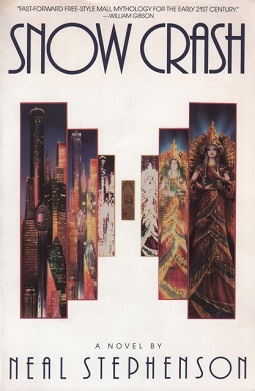Snow Crash is a science fiction novel by the American writer Neal Stephenson, published in 1992. Like many of Stephenson's novels, its themes include history, linguistics, anthropology, archaeology, religion, computer science, politics, cryptography, memetics, and philosophy.
In his 1999 essay "In the Beginning... Was the Command Line", Stephenson explained the title of the novel as his term for a particular software failure mode on the early Macintosh computer. Stephenson wrote about the Macintosh "When the computer crashed and wrote gibberish into the bitmap, the result was something that looked vaguely like static on a broken television set—a 'snow crash'".Stephenson has also mentioned that Julian Jaynes' book The Origin of Consciousness in the Breakdown of the Bicameral Mind was one of the main influences on Snow Crash.
Stephenson originally planned Snow Crash as a computer-generated graphic novel in collaboration with artist Tony Sheeder. In the author's acknowledgments (in some editions), Stephenson recalls:
"it became clear that the only way to make the Mac do the things we needed was to write a lot of custom image-processing software. I have probably spent more hours coding during the production of this work than I did actually writing it, even though it eventually turned away from the original graphic concept..."
Snow Crash was nominated for both the British Science Fiction Award in 1993 and the Arthur C. Clarke Award in 1994.
Plot summary
Plot background
The story opens in Los Angeles in the 21st century, an unspecified number of years after a worldwide economic collapse. Los Angeles is no longer part of the United States since the federal government has ceded most of its power and territory to private organizations and entrepreneurs. Franchising, individual sovereignty, and private vehicles reign supreme. Mercenary armies compete for national defense contracts, while private security guards preserve the peace in sovereign gated housing developments. Highway companies compete to attract drivers to their roads, and all mail delivery is by hired courier. The remnants of government maintain authority only in isolated compounds, where they do tedious make-work that is, by and large, irrelevant to the society around them. Much of the world's territory has been carved up into sovereign enclaves known as Franchise-Organized Quasi-National Entities (FOQNEs), each run by its own big business franchise (such as "Mr. Lee's Greater Hong Kong", or the corporatized American Mafia), or various residential burbclaves (quasi-sovereign gated communities). In this future, American institutions are far different from those in the actual United States at the time the book was published; for example, a for-profit organization, the CIC, has evolved from the CIA's merger with the Library of Congress.
